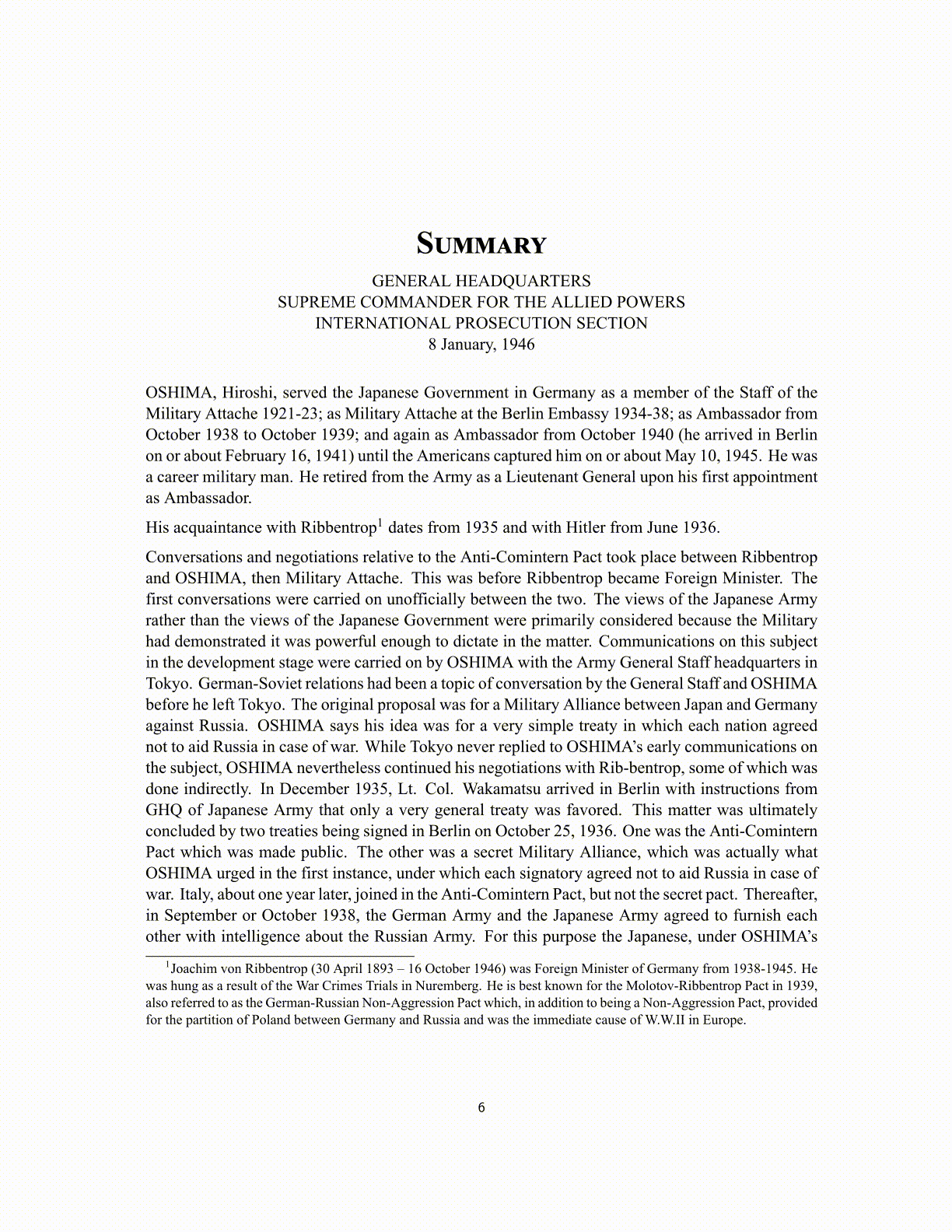
SUMMARY GENERAL HEADQUARTERS SUPREME COMMANDER FOR THE ALLIED POWERS INTERNATIONAL PROSECUTION SECTION 8 January, 1946 OSHIMA, Hiroshi, served the Japanese Government in Germany as a member of the Staff of the Military Attache 1921-23; as Military Attache at the Berlin Embassy 1934-38; as Ambassador from October 1938 to October 1939; and again as Ambassador from October 1940 (he arrived in Berlin on or about February 16, 1941) until the Americans captured him on or about May 10, 1945. He was a career military man. He retired from the Army as a Lieutenant General upon his first appointment as Ambassador. His acquaintance with Ribbentrop 1 dates from 1935 and with Hitler from June 1936. Conversations and negotiations relative to the Anti-Comintern Pact took place between Ribbentrop and OSHIMA, then Military Attache. This was before Ribbentrop became Foreign Minister. The first conversations were carried on unofficially between the two. The views of the Japanese Army rather than the views of the Japanese Government were primarily considered because the Military had demonstrated it was powerful enough to dictate in the matter. Communications on this subject in the development stage were carried on by OSHIMA with the Army General Staff headquarters in Tokyo. German-Soviet relations had been a topic of conversation by the General Staff and OSHIMA before he left Tokyo. The original proposal was for a Military Alliance between Japan and Germany against Russia. OSHIMA says his idea was for a very simple treaty in which each nation agreed not to aid Russia in case of war. While Tokyo never replied to OSHIMA’s early communications on the subject, OSHIMA nevertheless continued his negotiations with Rib-bentrop, some of which was done indirectly. In December 1935, Lt. Col. Wakamatsu arrived in Berlin with instructions from GHQ of Japanese Army that only a very general treaty was favored. This matter was ultimately concluded by two treaties being signed in Berlin on October 25, 1936. One was the Anti-Comintern Pact which was made public. The other was a secret Military Alliance, which was actually what OSHIMA urged in the first instance, under which each signatory agreed not to aid Russia in case of war. Italy, about one year later, joined in the Anti-Comintern Pact, but not the secret pact. Thereafter, in September or October 1938, the German Army and the Japanese Army agreed to furnish each other with intelligence about the Russian Army. For this purpose the Japanese, under OSHIMA’s 1 Joachim von Ribbentrop (30 April 1893 – 16 October 1946) was Foreign Minister of Germany from 1938-1945. He was hung as a result of the War Crimes Trials in Nuremberg. He is best known for the Molotov-Ribbentrop Pact in 1939, also referred to as the German-Russian Non-Aggression Pact which, in addition to being a Non-Aggression Pact, provided for the partition of Poland between Germany and Russia and was the immediate cause of W.W.II in Europe. 6